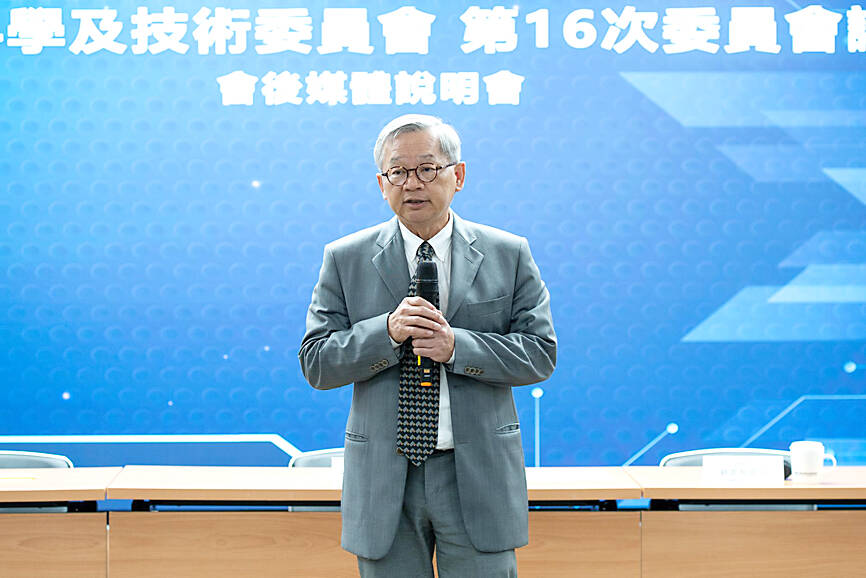The National Science and Technology Council yesterday proposed that next year’s technology budget be trimmed to NT$160.1 billion (US$5.44 billion) amid a significant reduction in the central government’s revenue as new allocation rules take effect.
The council at the beginning of this year had proposed an annual 13 percent hike to NT$180 billion for next year to fund the advancement of the semiconductor and artificial intelligence (AI) industries, as well as other strategic industries.
The revised budget still marks a new record, but would only be a 0.4 percent rise from this year’s NT$159.5 billion budget, the council said.

Photo courtesy of the National Science and Technology Council
The downward revision came as the central government expects a 28 percent reduction in annual revenue following revisions to the Act Governing the Allocation of Government Revenues and Expenditures (財政收支劃分法).
When the new rules are applied next year, the central government’s spending power would fall by NT$375.3 billion annually, Directorate-General of Budget, Accounting and Statistics data showed.
Local governments would get a bigger share of the total revenue, the act says.
The council called on lawmakers and the Cabinet to better communicate with each other, and to boost 2027’s technology budget to NT$180 billion.
The technology budget is part of the government’s efforts to enhance Taiwan’s technology prowess and boost supply chain resilience, given growing competition and geopolitical risks.
The technology budget would be allocated mainly for the “five trusted industries”: semiconductors, AI, defense, security, surveillance and next-generation communications.
The agency proposed NT$21.19 billion for the Chips Team Taiwan program, accounting for the largest portion of the technology budget.
About NT$10.27 billion was earmarked for the government’s net zero emissions project and NT$4.39 billion to fund next-generation communications technology, the council said.
About NT$2.23 billion was earmarked for the project to foster a “new Silicon Valley” in Tainan and NT$2.29 billion would be allocated to support smart robot development, it said.

KEEPING UP: The acquisition of a cleanroom in Taiwan would enable Micron to increase production in a market where demand continues to outpace supply, a Micron official said Micron Technology Inc has signed a letter of intent to buy a fabrication site in Taiwan from Powerchip Semiconductor Manufacturing Corp (力積電) for US$1.8 billion to expand its production of memory chips. Micron would take control of the P5 site in Miaoli County’s Tongluo Township (銅鑼) and plans to ramp up DRAM production in phases after the transaction closes in the second quarter, the company said in a statement on Saturday. The acquisition includes an existing 12 inch fab cleanroom of 27,871m2 and would further position Micron to address growing global demand for memory solutions, the company said. Micron expects the transaction to

Vincent Wei led fellow Singaporean farmers around an empty Malaysian plot, laying out plans for a greenhouse and rows of leafy vegetables. What he pitched was not just space for crops, but a lifeline for growers struggling to make ends meet in a city-state with high prices and little vacant land. The future agriculture hub is part of a joint special economic zone launched last year by the two neighbors, expected to cost US$123 million and produce 10,000 tonnes of fresh produce annually. It is attracting Singaporean farmers with promises of cheaper land, labor and energy just over the border.

US actor Matthew McConaughey has filed recordings of his image and voice with US patent authorities to protect them from unauthorized usage by artificial intelligence (AI) platforms, a representative said earlier this week. Several video clips and audio recordings were registered by the commercial arm of the Just Keep Livin’ Foundation, a non-profit created by the Oscar-winning actor and his wife, Camila, according to the US Patent and Trademark Office database. Many artists are increasingly concerned about the uncontrolled use of their image via generative AI since the rollout of ChatGPT and other AI-powered tools. Several US states have adopted

A proposed billionaires’ tax in California has ignited a political uproar in Silicon Valley, with tech titans threatening to leave the state while California Governor Gavin Newsom of the Democratic Party maneuvers to defeat a levy that he fears would lead to an exodus of wealth. A technology mecca, California has more billionaires than any other US state — a few hundred, by some estimates. About half its personal income tax revenue, a financial backbone in the nearly US$350 billion budget, comes from the top 1 percent of earners. A large healthcare union is attempting to place a proposal before